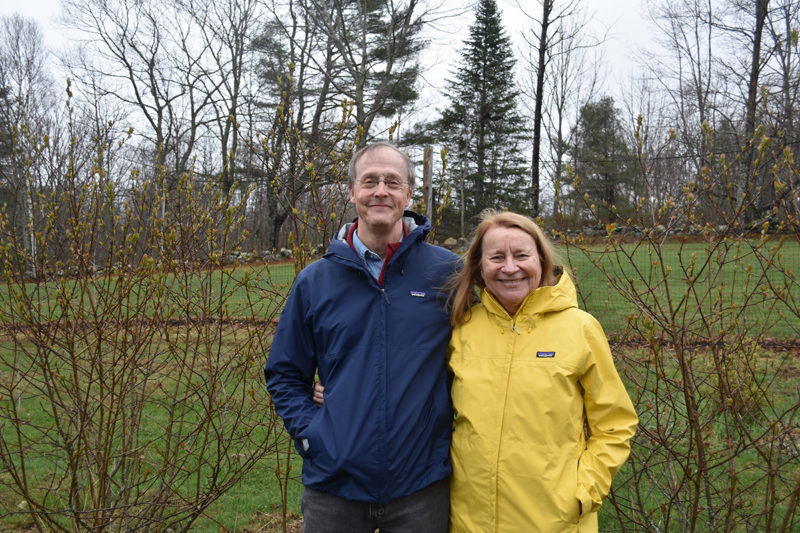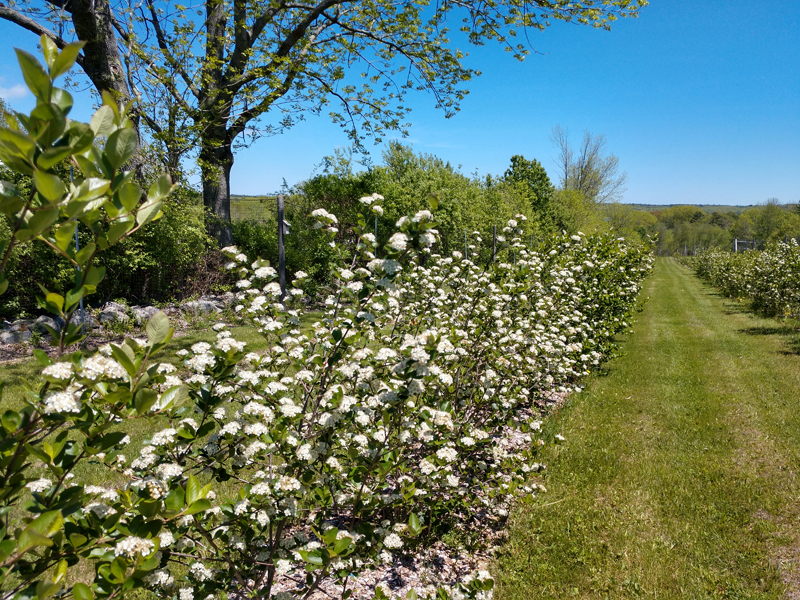
Scott and Sue Simpson, owners of Waldoberry Farm in Waldoboro, stand with their certified-organic Aronia berry bushes. The couple uses Aronia and other specialty berries in health-focused products developed and made by Sue Simpson. (Elizabeth Walztoni photo)
A Waldoboro couple with passion for unique berries is using their retirement to create extracts and teas at their home from start to finish. Scott and Sue Simpson, owners of Waldoberry Farm, cultivate, harvest, and process organic elderberries, Cornelian cherries, raspberries, and their signature Aronia berries on about an acre of land.
“It’s fun because it’s a tiny business, but we have to do it all … we grow it, we develop it, we take care of the berries, create recipes, and then make the product, and market and sell it,” Scott Simpson said.
The Simpsons moved to Waldoboro full time in 2015 when they retired and began growing berries the following year to make use of their land.
Sue Simpson used the berries in her recipes, leading to the Aronia extract and soothing tea she makes at home in her certified kitchen and sells to local stores.
The extract is made with over a pound of berries per 16-ounce bottle, combined with raspberries, sugar, and lemon. Simpson’s tea includes Aronia, elderflowers, lemon balm, raspberry leaves, and spearmint grown on the farm.
Soon, a Cornelian cherry extract will join the product ranks. The couple also sells elderberry cuttings in the spring.
Sue Simpson learned about elderberries from an article in Down East magazine, and expanded her knowledge from Washington tree grower Sharon Turner, of Crystal Lake Farm.
Today, the Simpsons’ biggest crop is Aronia berries – also known as black chokeberries — which they find easier to work with and less labor intensive than elderberries.
The berries on an elderberry bush do not ripen all at once, meaning the same plant has to be harvested multiple times, and when frozen, the berries clump together. Elderberries contain cyanide and must be cooked before eating.
Aronia, in contrast, can be eaten off the vine, are only harvested twice a year, and freeze “like marbles,” Scott Simpson said.
He also appreciates the flavor of the dark berries, which are similar to elderberries without the “funky undertones.”
Two hundred Aronia shrubs, 60 elderberry bushes, and 10 Cornelian cherry trees round out the orchard.
“They were the healthy berries,” Sue Simpson said of her choices.
Cornelian cherries, also popular in eastern Europe, are not related to conventional cherries. Rather, they are a member of the dogwood family, and are used in traditional medicine, according to the Simpsons.
Sue Simpson developed the recipes herself with product testing assistance from the University of Maine. Even before starting the farm, she said she had made syrups with her family and taken an interest in medicinal foods.
As growers of unique products, the Simpsons said they also focus on education.
The Aronia berry is relatively unknown in the United States and most popular in eastern Europe, particularly Poland, the Simpsons said, although it is native to Maine.
Iowa is the center of Aronia production in the United States today and interest is growing, according to the couple.
“I think in the coming years, we’ll see a lot more,” Sue Simpson said.
The Simpsons also cited studies that found high antioxidant and polyphenol content in the berries. They both take a teaspoon of extract every day to good results, and say the business has received warm response at tastings and from customer reviews.
“I’ve always been for good health and interested in wellness,” Sue Simpson said. “That’s very rewarding to me.”

Aronia shrubs flower at Waldoberry Farm in Waldoboro. The berries, primary crop for owners Scott and Sue Simpson, are used in the medicinal-focused Aronia extract and tea Sue Simpson makes onsite for sale at local retailers. (Photo courtesy Scott and Sue Simpson)
The Simpsons said working together on the business suits them well. Scott Simpson does the heavy labor and uses the tractor, while Sue Simpson is the “idea person,” working on products and marketing.
“We travel well together,” Scott Simpson said.
When the raspberries come in, they spend two and a half hours harvesting every other day for a month and a half. Last season, they took in 300 pounds from 600 feet of bushes. They still sell elderberry cuttings for planting and harvest the flowers for tea.
The berries are harvested, stored, and processed in their certified home kitchen using Sue Simpson’s recipes.
“Freezer space is at a premium,” Scott Simpson said with a laugh.
They enjoy being outside, keeping busy, and producing a medicinal product.
“We were both hard workers in our careers anyway,” Scott Simpson said.
Waldoberry Farm is certified organic through the Maine Organic Farmers and Gardeners Association.
The business does not ship products. Aronia extract and soothing tea can be found at Rising Tide Co-op in Damariscotta, The Maine Organic Marketplace in Freeport, and Morning Glory Natural Foods in Brunswick.
Elderberry cuttings can be found in the spring at Rising Tide, Fresh Off The Farm in Rockport, and the Good Tern Co-op in Rockland.
The couple’s Aronia berries are also sold to Wild Root Kombucha and Apres seltzer in Portland for use in drinks and Slow Rise Farm in Pittston for fruit leather.
For more information on Waldoberry Farm’s berries and products, go to waldoberryfarm.com.






